After 40, menopause occurs, the ovarian function progressively decreases in women. Though during this period, the possibility to become pregnant significantly reduces, pregnancy occurs not so rare, since many women, even at this age, have regular ovulation. In this age period, pregnancy and childbirth proceeds on the background of various chronic diseases such as cardiovascular diseases, diseases of the urinary system, liver, chronic inflammatory processes of the genital organs, uterine fibroids, prolapse of the uterus and vagina, etc. These are unfavorable effects on the health of both the mother and the child.
Since by the age of 40-49, most women are no longer going to have children, the onset of pregnancy is often terminated by induced abortion. But abortion at this age is often complicated by inflammatory diseases of the genital organs, the development of uterine fibroids, endometriosis, a severe course of menopause, can provoke the development of oncological diseases. Therefore, birth control is also necessary at this age.
The main difficulties in choosing methods of birth control in women 40-49 years old are associated with the existing risk factors (overweight, smoking, concomitant diseases, etc.).
Women aged 45-50 are often contraindicated for intrauterine devices because of various diseases such as:
- large uterine fibroids;
- pathological cervical changes.
Hormonal birth control
Hormonal birth control over 40 is distinguished by its high efficiency and pronounced healing properties in several gynecological diseases. Women using this cheap birth control option are less predisposed to osteoporosis, ovarian, and uterine cancer.
Combined birth control pills are contraindicated in women who:
- smoke heavily;
- have previously had cases of blockage (thrombosis) of various blood vessels (heart attacks, strokes, thrombophlebitis, etc.);
- have severe diabetes mellitus;
- have liver diseases.
However, low-dose drugs of the latest generation have much fewer side effects, so their use is allowed for women over 40.
Injections and implants
The long-term effect of these birth control options attracts many women. Injections persist the effect for 3 months and up to 5 years for implants. All birth control procedures are invasive and require to make an appointment with the doctor. You can theoretically cope with an intramuscular injection, but not with subcutaneous implantation.
If an injection is made and side effects appear, then they will persist for the entire drug duration.
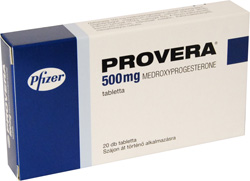
Provera Review
- Active Ingredient: Medroxyprogesterone Acetate
- Release Form: Pills, Suspension for Injection
- Age: 18 - 45 years
- Average Price: $10
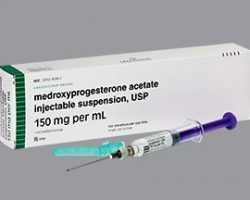
Medroxyprogesterone Review
- Active Ingredient: Medroxyprogesterone Acetate
- Release Form: Pills, Suspension for Injection
- Age: 18 - 45 years
- Average Price: $10
An intrauterine device – vaginal ring
The efficiency of intrauterine devices is up to 99%. A vaginal ring is very convenient to use. Periodically, monitor the position of the intrauterine device. Such devices are placed not in all women over 40. If there are no contraindications, it is one of the most effective birth control options. Consult your gynecologist to find out this aspect.
A vaginal ring is a small flexible plastic ring that is inserted into your vagina once a month for three weeks. In the fourth week, the ring is taken out for the menstrual bleeding to start. The ring contains analogs of female hormones (estrogen and progestin), which it slowly releases in small doses. Estrogen stops the egg maturation; progestin thickens the cervical mucus, thus inhibiting the movement of sperm.
Efficiency
Pros
- A woman should remember when the ring must be placed and removed;
- The menstrual cycle stabilizes, pains, premenstrual syndrome, and tenderness of the mammary glands disappear;
- Prevention of certain types of cancer, inflammatory diseases, and neoplasms.
Cons
- Some skills to correctly place the vaginal ring – for many women this does not work the first time, the doctor should show everything for the first time;
- Long-term drug tolerance – the mammary glands will become tendered, nausea may persist;
- There is a big list of contraindications and side effects.
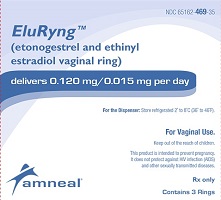
EluRyng Review
- Active Ingredient: Ethinylestradiol / Etonogestrel
- Release Form: Vaginal Ring
- Age: 18 - 45 years
- Average Price: $60.00
Contraceptive patch – effective hormonal birth control
A transdermal patch is a thin, flesh-colored means. It is stuck to the skin. Gradually, the patch releases hormones (estrogen and progestin) into the blood flow. This method of birth control is effective and safe. The hormone level is low.
Efficiency
Pros
- A woman only needs to stick the patch for a month;
- A progestin can solve some problems with the menstrual cycle, most often – menstrual pain will disappear;
- Many women find that their skin condition improves.
Cons
- Although the contraceptive patch is not unstuck, doctors recommend not to visit baths and saunas;
- Local allergic reactions are possible to manifest;
- Many women get used to the effects of hormones with unpleasant side effects for two to three months – nausea, headache, etc.;
- There is a decrease in libido and a sharp increase in weight.
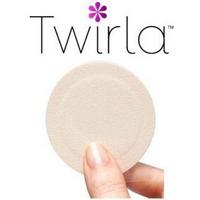
Twirla Review
- Active Ingredient: Ethinylestradiol / Levonorgestrel
- Release Form: Transdermal Patch
- Age: 18 - 45 years
- Average Price: $3
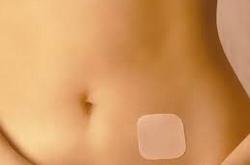
Ethinyl Estradiol / Norelgestromin Review
- Active Ingredient: Ethinyl Estradiol / Norelgestromin
- Release Form: Transdermal Patch
- Age: 18 - 45 years
- Average Price: $30 - $40
Spermicides
Contraceptive suppositories as birth control are a type of chemical contraception. They contain a chemical that destroys male sperm. Under the influence of aggressive chemicals on the sperm, the membrane of the male reproductive cell is destroyed. The head is set apart from the flagellum, and the sperm loses its ability to move. Due to motor disability, such sperm are no longer a threat, since it cannot get to the egg to fertilize it.
Additional active components of the birth control suppository cause thickening of the cervical mucus, which is an additional obstacle for sperm cells. Such suppositories do not give 100% protection. According to statistics, when using such birth control in women over 40, about 15% of women become pregnant throughout the year.
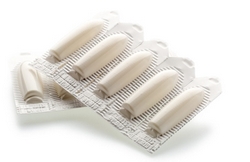
Nonoxynol-9 Review
- Active Ingredient: Nonoxynol-9
- Release Form: Vaginal Suppository
- Age: 18 - 55 years
- Average Price: $20

Shur-Seal Gel Review
- Active Ingredient: Nonoxynol-9
- Release Form: Vaginal Gel
- Age: 18 - 55 years
- Average Price: $30 - $40
What suppositories are better to choose after 40?
It is rather difficult for a women over 40 to choose the right suppository. The difficulties lie in the constant decline in reproductive functions, against which the risks of developing a variety of hormone-related pathologies increase. That is why birth control suppositories at this age should be used with extreme caution, and only according to a doctor’s prescription.
Self-administration of such drugs is unacceptable and is fraught with severe health problems.
Genora 1/50 Review
Next Choice One Dose Review
Nordette 28 Review
Nortrel 0.5/35 Review
Cyonanz Review
Blisovi Fe 1.5/30 Review
Cyclafem 7 / 7 / 7 Review
Brevicon Review
Enpresse Review
Hailey 24 Fe Review
Gildess 24 Fe Review
EContra One-Step Review
Zumandimine Review
Junel Fe 24 Review
Trivora-28 Review
Aftera Review
Hailey Fe 1 / 20 Review
Ethinyl Estradiol / Norgestrel Review
Levlite Review
Qlaira Review
Tulana Review
Levonest Review
Lomedia 24 Fe Review
Ayuna Review
Microgestin 24 Fe Review
Sronyx Review
Nexesta Fe Review
Nortrel 7/7/7 Review
Nylia 1 / 35 Review
Delyla Review
Alyacen 1 / 35 Review
Altavera Review
Tri-Previfem Review
Deblitane Review
Dasetta 1 / 35 Review
Norinyl 1+35 Review
Nortrel 1/35 Review
Norethindrone Review
Larin 1.5 / 30 Review
Fallback Solo Review
Next Choice Review
Tri-Estarylla Review
Solia Review
Junel 1 / 20 Review
Camila Review
Trinessa Lo Review
Mestranol / Norethindrone Review
Wera Review
Nor-QD Review
Modicon Review
Plan B Review
Lutera Review
Necon 1 / 35 Review
Lessina Review
Myzilra Review
Juleber Review
Blisovi 24 Fe Review
Cyclafem 1/35 Review
Larin 1/20 Review
Kalliga Review
Caziant Review
Larin Fe 1.5/30 Review
Cesia Review
Elinest Review
Larissia Review
Sharobel Review
Aranelle Review
Norlyda Review
Tri-Norinyl Review
Tri-Legest Review
Ulipristal Off Label Review
Heather Review
Ortho-Novum 1/50 Review
Leena Review
Beyaz Review
Wymzya Fe Review
Triphasil Review
Ulipristal Review
Option 2 (Levonorgestrel Tablet 1.5 mg) Emergency Contraceptive Review
Plan B One-Step Emergency Contraceptive (Levonorgestrel Tablet 1.5 mg) Review
Dasetta 7/7/7 Review
Ethinyl Estradiol/Folic Acid/Levonorgestrel Review
Kaitlib Fe Review
Loestrin Fe 1.5 / 30 Review
Mibelas 24 Fe Review
Cyclessa Review
Orsythia Review
Take Action Emergency Contraceptive Levonorgestrel 1.5mg Review
Ovral 28 Review
Ogestrel 0.5 / 50 Review
Gildess 1.5 / 30 Review
Ethinyl Estradiol / Etonogestrel
Simpesse Review
Ortho Micronor Review
FaLessa Kit Review
Jaimiess Review
Lo-Zumandimine Review
Jenest 28 Review
Amethyst Review
Briellyn Review
Quasense Review
Setlakin Review
Melodetta 24 Fe Review
Ovcon 35 Review
Tri-Lo-Mili Review
Zeosa Review
Ella Review
Ovcon 50 Review
Vestura Review
CamreseLo Review
Zenchent Fe Review
Lo Simpesse Review
Amethia Lo Review
Larin 24 Fe Review
Kurvelo Review
Jencycla Review
Provera Review
Medroxyprogesterone Review
Errin Review
Ethinyl Estradiol / Norethindrone Review
Microgestin 1 / 20 Review
Cryselle Review
AfterPill Review
Rugby Levonorgestrel Tablet Review
Lyza Review
Aviane Review
Morning After Review
Blisovi Fe 1 / 20 Review
New Day Review
Ovrette Review
Microgestin Fe 1/20 Review
Apri Review
Kelnor 1/35 Review
Tri-Lo-Estarylla Review
Aurovela Fe 1.5 / 30 Review
Larin Fe 1 / 20 Review
Necon 0.5 / 35 Review
Ortho Novum 1/35 Review
Necon 7 / 7 / 7 Review
Microgestin Fe 1.5/30 Review
Cyred Review
Falmina Review
Levlen Review
Gildagia Review
Alesse 21/28 Review
Gildess Fe 1.5/30 Review
Incassia Review
Yasmin 28 Review
Tarina 24 Fe Review
Preventeza Review
Yaz Review
Pirmella 7/7/7 Review
Aubra Review
Levonorgestrel Tablets 0.75mg Emergency Contraceptive Review
Zenchent Review
Ortho-Novum 7 / 7 / 7 Review
Opcicon One-Step Review
Lo-Ovral (21/28) Review
My Choice Emergency Contraceptive (Levonorgestrel Tablet 1.5 mg) Review
Iclevia Review
Yasmin 21 Review
Ethinyl Estradiol / Levonorgestrel Review
Estrostep Fe Review
Demulen 1/35-21/28 Review
Jasmiel Review
Chateal Review
Pimtrea Review
Tilia Fe Review
Estrostep 21 Review
Ethinyl Estradiol / Ethynodiol
Azurette Review
Emoquette Review
Zarah Review
Kariva Review
Reclipsen Review
Ortho-Cept Review
Viorele Review
Mircette Review
Tri-Levlen Review
Bekyree Review
Enskyce Review
Kimidess Review
Nora-Be Review
Zovia 1 / 35E Review
Volnea Review
Microgestin 1.5 / 30 Review
Zovia 1/50E Review
Mili Review
Syeda Review
VyLibra Review
Desogen Review
Gianvi Review
EContra EZ Review
Gildess Fe 1 / 20 Review
Junel Fe 1.5 / 30 Review
Loestrin 24 Fe Review
Nylia 7/7 /7 Review
Nikki Review
Junel 1.5/30 Review
Gildess 1/20 Review
Tarina Fe 1 / 20 Review
Velivet Review
Tri-Mili Review
Taytulla Review
My Way Emergency Contraceptive (Levonorgestrel Tablet 1.5 mg) Review
Femynor Review
Tri-VyLibra Review
Philith Review
Tri-Legest Fe Review
Loestrin 21 1 / 20 Review
Tri Femynor Review
Lillow Review
Pirmella 1/35 Review
Kelnor 1 / 50 Review
Afirmelle Review
Aurovela 1.5/30 Review
Alyacen 7 / 7 / 7 Review
Aurovela 1/20 Review
Desogestrel / Ethinyl Estradiol Review
Isibloom Review
Aurovela 24 Fe Review
Ortho-Novum 10/11 Review
Tri-Lo-Marzia Review
Loestrin Fe 1 / 20 Review
Necon 10/11 Review
Genora 1/35 Review
Aurovela Fe 1/20 Review
Genora 1/50 Review
Next Choice One Dose Review
Nordette 28 Review
Nortrel 0.5/35 Review
Cyonanz Review
Blisovi Fe 1.5/30 Review
Cyclafem 7 / 7 / 7 Review
Brevicon Review
Enpresse Review
Hailey 24 Fe Review
Gildess 24 Fe Review
EContra One-Step Review
Zumandimine Review
Junel Fe 24 Review
Trivora-28 Review
Aftera Review
Hailey Fe 1 / 20 Review
Ethinyl Estradiol / Norgestrel Review
Levlite Review
Qlaira Review
Tulana Review
Levonest Review
Lomedia 24 Fe Review
Ayuna Review
Microgestin 24 Fe Review
Sronyx Review
Nexesta Fe Review
Nortrel 7/7/7 Review
Nylia 1 / 35 Review
Delyla Review
Alyacen 1 / 35 Review
Altavera Review
Tri-Previfem Review
Deblitane Review
Dasetta 1 / 35 Review
Norinyl 1+35 Review
Nortrel 1/35 Review
Norethindrone Review
Larin 1.5 / 30 Review
Fallback Solo Review
Next Choice Review
Tri-Estarylla Review
Solia Review
Junel 1 / 20 Review
Camila Review
Trinessa Lo Review
Mestranol / Norethindrone Review
Wera Review
Nor-QD Review
Modicon Review
Plan B Review
Lutera Review
Necon 1 / 35 Review
Lessina Review
Myzilra Review
Juleber Review
Blisovi 24 Fe Review
Cyclafem 1/35 Review
Larin 1/20 Review
Kalliga Review
Caziant Review
Larin Fe 1.5/30 Review
Cesia Review
Elinest Review
Larissia Review
Sharobel Review
Aranelle Review
Norlyda Review
Tri-Norinyl Review
Tri-Legest Review
Ulipristal Off Label Review
Heather Review
Ortho-Novum 1/50 Review
Leena Review
Beyaz Review
Wymzya Fe Review
Triphasil Review
Ulipristal Review
Option 2 (Levonorgestrel Tablet 1.5 mg) Emergency Contraceptive Review
Plan B One-Step Emergency Contraceptive (Levonorgestrel Tablet 1.5 mg) Review
Dasetta 7/7/7 Review
Ethinyl Estradiol/Folic Acid/Levonorgestrel Review
Kaitlib Fe Review
Loestrin Fe 1.5 / 30 Review
Mibelas 24 Fe Review
Cyclessa Review
Orsythia Review
Take Action Emergency Contraceptive Levonorgestrel 1.5mg Review
Ovral 28 Review
Ogestrel 0.5 / 50 Review
Gildess 1.5 / 30 Review
Ethinyl Estradiol / Etonogestrel
Simpesse Review
Ortho Micronor Review
FaLessa Kit Review
Jaimiess Review
Lo-Zumandimine Review
Jenest 28 Review
Amethyst Review
Briellyn Review
Quasense Review
Setlakin Review
Melodetta 24 Fe Review
Ovcon 35 Review
Tri-Lo-Mili Review
Zeosa Review
Ella Review
Ovcon 50 Review
Vestura Review
CamreseLo Review
Zenchent Fe Review
Lo Simpesse Review
Amethia Lo Review
Larin 24 Fe Review
Kurvelo Review
Jencycla Review
Provera Review
Medroxyprogesterone Review
Errin Review
Ethinyl Estradiol / Norethindrone Review
Microgestin 1 / 20 Review
Cryselle Review
AfterPill Review
Rugby Levonorgestrel Tablet Review
Lyza Review
Aviane Review
Morning After Review
Blisovi Fe 1 / 20 Review
New Day Review
Ovrette Review
Microgestin Fe 1/20 Review
Apri Review
Kelnor 1/35 Review
Tri-Lo-Estarylla Review
Aurovela Fe 1.5 / 30 Review
Larin Fe 1 / 20 Review
Necon 0.5 / 35 Review
Ortho Novum 1/35 Review
Necon 7 / 7 / 7 Review
Microgestin Fe 1.5/30 Review
Cyred Review
Falmina Review
Levlen Review
Gildagia Review
Alesse 21/28 Review
Gildess Fe 1.5/30 Review
Incassia Review
Yasmin 28 Review
Tarina 24 Fe Review
Preventeza Review
Yaz Review
Pirmella 7/7/7 Review
Aubra Review
Levonorgestrel Tablets 0.75mg Emergency Contraceptive Review
Zenchent Review
Ortho-Novum 7 / 7 / 7 Review
Opcicon One-Step Review
Lo-Ovral (21/28) Review
My Choice Emergency Contraceptive (Levonorgestrel Tablet 1.5 mg) Review
Iclevia Review
Yasmin 21 Review
Ethinyl Estradiol / Levonorgestrel Review
Estrostep Fe Review
Demulen 1/35-21/28 Review
Jasmiel Review
Chateal Review
Pimtrea Review
Tilia Fe Review
Estrostep 21 Review
Ethinyl Estradiol / Ethynodiol
Azurette Review
Emoquette Review
Zarah Review
Kariva Review
Reclipsen Review
Ortho-Cept Review
Viorele Review
Mircette Review
Tri-Levlen Review
Bekyree Review
Enskyce Review
Kimidess Review
Nora-Be Review
Zovia 1 / 35E Review
Volnea Review
Microgestin 1.5 / 30 Review
Zovia 1/50E Review
Mili Review
Syeda Review
VyLibra Review
Desogen Review
Gianvi Review
EContra EZ Review
Gildess Fe 1 / 20 Review
Junel Fe 1.5 / 30 Review
Loestrin 24 Fe Review
Nylia 7/7 /7 Review
Nikki Review
Junel 1.5/30 Review
Gildess 1/20 Review
Tarina Fe 1 / 20 Review
Velivet Review
Tri-Mili Review
Taytulla Review
My Way Emergency Contraceptive (Levonorgestrel Tablet 1.5 mg) Review
Femynor Review
Tri-VyLibra Review
Philith Review
Tri-Legest Fe Review
Loestrin 21 1 / 20 Review
Tri Femynor Review
Lillow Review
Pirmella 1/35 Review
Kelnor 1 / 50 Review
Afirmelle Review
Aurovela 1.5/30 Review
Alyacen 7 / 7 / 7 Review
Aurovela 1/20 Review
Desogestrel / Ethinyl Estradiol Review
Isibloom Review
Aurovela 24 Fe Review
Ortho-Novum 10/11 Review
Tri-Lo-Marzia Review
Loestrin Fe 1 / 20 Review
Necon 10/11 Review
Genora 1/35 Review
Aurovela Fe 1/20 Review
Genora 1/50 Review